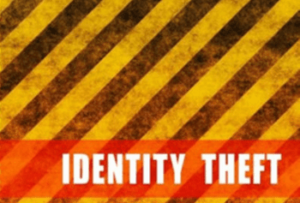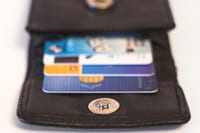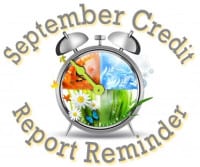 According to LifeLock, 84% of people’s information is on the dark web. Is yours? Think about how you will protect yourself and your information. How often do you check your bank accounts? How often do you check your credit card accounts? You can monitor all this yourself by checking regularly. We check our accounts once per week and we have chosen to freeze our credit reports. #JillRussoFoster #FinancialLiteracyMonth
According to LifeLock, 84% of people’s information is on the dark web. Is yours? Think about how you will protect yourself and your information. How often do you check your bank accounts? How often do you check your credit card accounts? You can monitor all this yourself by checking regularly. We check our accounts once per week and we have chosen to freeze our credit reports. #JillRussoFoster #FinancialLiteracyMonth
Financial Literacy Month #12
 According to Lending Tree, consumer debt is up 7% over last year and has hit $1.27 trillion. Do you have credit card debt? If you carry a balance, call your credit card company and ask for a lower interest rate. Lending Tree also stated that 76% of people who asked we given a lower rate. #JillRussoFoster #FinancialLiteracyMonth
According to Lending Tree, consumer debt is up 7% over last year and has hit $1.27 trillion. Do you have credit card debt? If you carry a balance, call your credit card company and ask for a lower interest rate. Lending Tree also stated that 76% of people who asked we given a lower rate. #JillRussoFoster #FinancialLiteracyMonth
Financial Literacy Month #4
 Curious about your credit score? You can get a close approximation of your score through some bank and credit card websites or through the credit reports bureaus Quizzle, Credit Karma or Credit Sesame. These are all free to see an approximation of your credit score. #JillRussoFoster #FinancialLiteracyMonth
Curious about your credit score? You can get a close approximation of your score through some bank and credit card websites or through the credit reports bureaus Quizzle, Credit Karma or Credit Sesame. These are all free to see an approximation of your credit score. #JillRussoFoster #FinancialLiteracyMonth
Financial Literacy Month #3
 When was the last time you viewed your credit report? Check out your free report at www.AnnualCreditReport.com today. According to the Federal Trade Commission, 1 in 5 people have an error on one or more their reports. Errors can make a difference on getting approved or declined for credit requests and what interest rate you are offered. #JillRussoFoster #FinancialLiteracyMonth
When was the last time you viewed your credit report? Check out your free report at www.AnnualCreditReport.com today. According to the Federal Trade Commission, 1 in 5 people have an error on one or more their reports. Errors can make a difference on getting approved or declined for credit requests and what interest rate you are offered. #JillRussoFoster #FinancialLiteracyMonth
Protect Yourself

This weekend started off like any other weekend – running errands including a trip to the gas station. Everything seemed like a regular weekend. But here we are the next day and I go into my wallet and my ATM / debit card isn’t there.
First thing I do is to check my wallet, maybe I put in in another spot or maybe it’s loose in my purse. No such luck. Next, I go online to my bank account to see what transactions have posted, nothing that I didn’t recognize – that’s good. I immediately call my bank to ask them to freeze my card. This will give me a chance to look for it without any liability.
ATM / debit cards are different than credit cards when it comes to your liability. The most important thing to do is to contact your bank to stop your liability. If you contact your bank immediately before any unauthorized transactions occur, you have zero liability. The longer you wait, the more liability you have. Form more information, check out the Federal Trade Commission information page.
If I don’t find it today, I will call and cancel it and get a replacement card. Wish me luck in the search for my card.
Should you pay off your credit card debt with a mortgage refinance?
In our last Quick Tips, we talked about refinancing your mortgage. I hope you did your homework. If you decided that refinancing is right for you, you may be tempted to pay off your other debts by financing them into your mortgage.
Should you do it? Follow these steps to find out.
List all your debts
If debt is a problem for you, take a closer look. Make 5 columns:
Column 1: Write down the name of each creditor (credit card companies, auto dealership, bank, hospital, etc.)
Column 2: Write down why you took a loan or used a credit card. This will help you see how you came to be in debt. Were these essential expenses like a car or a hospital emergency? Or, were these items you could have saved for, like a vacation, clothes, or furniture.
Column 3. Write down the interest rate.
Column 4. Write down the current payment amount.
Column 5. Write down when it will be paid off at the current payment rate.
I know that this can be scary, but you need to know. Congratulate yourself for doing this. This is a huge step forward.
Why is it important to really look at your debt? If your debts just disappear into your mortgage, you could forget where they came from. Most people who consolidate their debt this way will have credit card debt again in just a few years.
Refinancing may not be the answer, but knowing how and why you spend will help you stay out of debt in the long run.
Consider the downside of consolidating your credit card debt into your mortgage. Credit card debt is unsecured, so you would be taking unsecured debt and betting your house on it. When you have credit card debt and can’t make payments, that’s a problem – but, your creditors cannot take your home. On the other hand, if you can’t make your mortgage payments, then you could lose your home in foreclosure. If you increased your mortgage loan in order to cover credit card debt, you could end up with a larger house payment – one that you can’t afford! That’s why I don’t recommend refinancing your unsecured debt into a mortgage.
Consider the long term outcome when refinancing secured debts into your mortgage.
Secured debt is a physical object that can be repossessed / foreclosed if you don’t pay: it could be a car, or even a home equity loan or line of credit. Here are three questions you should ask before making your decision:
1. If you combine your mortgage with your home equity will this mean you need to pay mortgage insurance? Mortgage insurance is added when the total amount of your mortgage is equal to, or over, 80% of your home’s appraised value. That will increase your monthly mortgage payment.
2. Will you need the home equity line in the future? It will be difficult to get a new line in these economic times.
3. Is it better to pay off your debts yourself, and have a tight budget for the short term? Or combine them with your refinance and have a bigger mortgage in the long term?
Think long and hard about what you put into your new mortgage. Consult with your tax preparer for an objective opinion.
Credit Card To The Rescue
 For several years, we were planning this big vacation for this year. We would be visiting several European countries over the course of three weeks. Lots of time and efforts was put into the planning and coordinating with friends we would be seeing along the way. Enter 2020 and the pandemic, and we cancelled everything.
For several years, we were planning this big vacation for this year. We would be visiting several European countries over the course of three weeks. Lots of time and efforts was put into the planning and coordinating with friends we would be seeing along the way. Enter 2020 and the pandemic, and we cancelled everything.
That left us with many refunds / credits to pursue. The airlines tickets were amazingly easy, we cancelled, and miles were returned to our account within days. We have a credit for future travel – easy. Hotels were all booked without a deposit – so that made cancellations easy. Excursions were fairly easy to cancel, although we have credits for one to use in the near future (I hope).
Now on to the hard part. We chose to cancel our cruise before the cruise line cancelled the cruise. We did it before final payment, as we did not want to have our money tied up. Now, we needed to get back our deposit plus some extra charges. We cancelled our cruise more than 90 days in advance, so all was refundable. We understood that refunds were taking quite a while and were patient. The credits started to come in and various amounts. No amount refunded was equal to the charges. So, we totaled up what was owed and started to subtract the refunds, but not all the money was returned. (Thanks to meticulous record keeping, we knew what was owed to us and how it was paid for).
Why is this important? Because when all was done, we were not made whole. We were shorted some of our money paid. We ended up filing a dispute with our credit card company. When you use a credit card for payment you have the added benefit for protection. We were able to provide all the details, original charge information and all the calls / emails to rectify the situation. This is important for your dispute case. Then just this past week, the dispute was resolved by our credit card company and we are all set, and we were made whole.
When you find yourself at your wits end and frustrated, know that your credit card company can help you resolve the situation. Remember this only works if you use a credit card for payment.
Your Financial Health
Do you ever wonder how your financial pictures stacks up? Are you on track to meet your goals? What do you need to still do? These and other questions are always on the man y people’s minds.
y people’s minds.
I have discussed the importance of having an emergency savings, a budget to know where your money is going, great credit /score to have the best interest rates when you need to borrow and minimal high interest debt. Check out some of my past emails for more information on these topics.
This is a great article Six Numbers Reveal the State of Your Financial Health. How well do your finances compare to these six areas? All are important areas that should be goals for you to accomplish with your finances.
Third Credit Report Reminder From Jill Russo Foster
It’s September – Get ready for the holidays! For this month use TransUnion for your credit report.
Hello, it’s Jill again, reminding you to get your finances in order before you start spending for the holidays.
Order your credit report from www.AnnualCreditReport.com. This is the ONLY authorized source for the no cost annual credit report that’s yours by law. You have the right to know. Exercise your rights! Learn more.
When ordering online:
- Select your state, then click Request Report.
- Fill out your information, then click Continue.
- When it asks you to select a service, select TransUnion.

Not comfortable ordering online? There are three ways you can order your report:
- Order online at www.AnnualCreditReport.com. By ordering online you can have your report back in minutes!
- Mail your postal order by downloading the form at www.AnnualCreditReport.com
- Call in your order at 1-877-322-8228
It doesn’t matter how you get your report, the most important thing is that you do! Then…
- Review it for accuracy!
- Follow the instructions with the report to correct any errors.
- And, always remember to keep copies for your records.
Were you hoping to get your credit score instead? Try CreditKarma.com. CreditKarma does not supply a FICO score, but it does provide scores from TransUnion and VantageScore. And, there’s no charge for you. CreditKarma funds their service through website advertising.
Wishing you the best for the school year and the coming holiday season!
Do You Need To Establish / Reestablish Your Credit?
I always get asked how someone should establish credit when I speak. Let me give you the answer. First whether you are establishing credit for the first time or reestablishing credit, this information is for you.
There are two main ways to establish credit:
The first option is to be a joint user with someone else. You would have to open a joint credit card with another person. That means that what you do (and what they do) will appear on both of your credit reports. If you both handle your credit wisely, that will reflect on both your credit reports positively. On the other hand, if one of you abuse your credit, that will reflect on both your credit reports as well. This can be a great way to establish your credit. Take a great thought when determining who the joint user will be. You want to be sure you are a joint user and not an authorized user – trust me there is a big difference.
The second option is to open a secured credit card. A secured credit card is where you give the credit card company a sum of money for them to give you the credit card (without risk or harm to them). Think of this as similar to a renter giving a security deposit to a Landlord. This is what you are doing. You get a credit card that looks and works just like a traditional credit card, but the creditor has minimal risk if you default. Remember, you are doing this to establish or reestablish credit.
When you need to establish or reestablish credit, you are a risky person (from a credit stand point) and you need to minimize the risk to the creditor for them to give you a chance. Once you have proven yourself, you can open a traditional credit card (with more favorable terms) and close the joint or secured credit card. Notice the order, I said in the previous sentence – do it in that order, please.
Keep your credit as best as possible and this will help you in the long run and give you the best possible finance down the road, but first you need to take this step to establish or reestablish your credit.
- 1
- 2
- 3
- …
- 9
- Next Page »